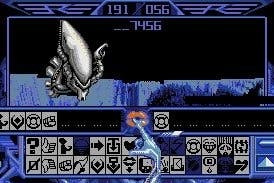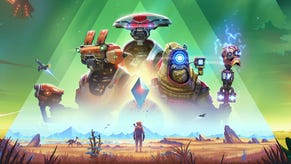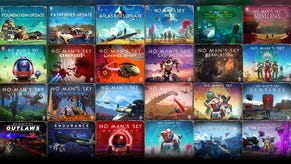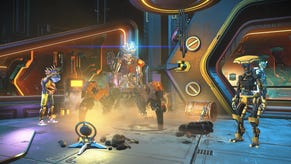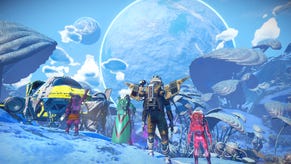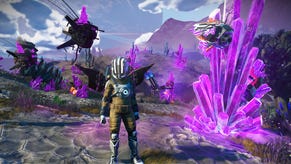Playlist: The games that shaped No Man's Sky
Hello games.
It's finally out, and so the mystery of what No Man's Sky is has been solved. Except there wasn't much mystery at all, it turns out - No Man's Sky, for all its soaring ambition, feels like it belongs to a long line of games that have taken the vast stretches of space as their canvas on which to work wonders. If anything, No Man's Sky feels like a game from another age, when you'd work through stacks of 3.5 inch floppy disks around a friend's house in search of something strange and new. The tension you get when a game built in the spirit of a more innocent time clashes with the suffocating hype, expectation and savage appetites of the modern age has made for a palpable tension of late, but hopefully it hasn't detracted from the marvellous achievement made by Hello Games. No Man's Sky may be on a different scale, and party to a very different audience, but it's more than worthy of rubbing shoulders with some of the following legends.
Captain Blood
Exxos, 1988
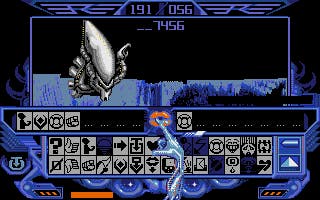
It's always been a numbers game around these parts - 16 bits get succeeded by 32, 60 frames per second wins out over 30 and now we're reaching for 4k over the paltry number of pixels that used to glow from an old CRT - and Amiga oddity Captain Blood bears that out. Back in 1988, 32,000 planets to explore seemed like an awful lot before No Man's Sky came along with its 18 quintillion, but despite the gulf in numbers there's still plenty of similarities between Hello Games' opus and French developers Phillipe Ulrich and Didier Bouchon's. Captain Blood is a brilliantly strange game in which you play as video game designer Bob Morlock (a name with deliberate echoes of sci-fi author Michael Moorcock and HG Wells' subterranean race from The Time Machine), exploring the vastness of space as you track down clones of yourself in order to slay them.
What makes it truly special - and where the link between No Man's Sky and Captain Blood is at its most explicit - is the way in which you communicate with aliens, conversing with 16 different races through the game's UPCOM (Universal Protocol of Communication) system, with 150 icons allowing you to converse as you slowly pick up new languages. No Man's Sky's own alien tongues, learnt through interacting with artefacts dotted around its vast galaxy, feels like a gentle nod in Captain Blood's direction.
Proteus
Ed Key and David Kanaga, 2013
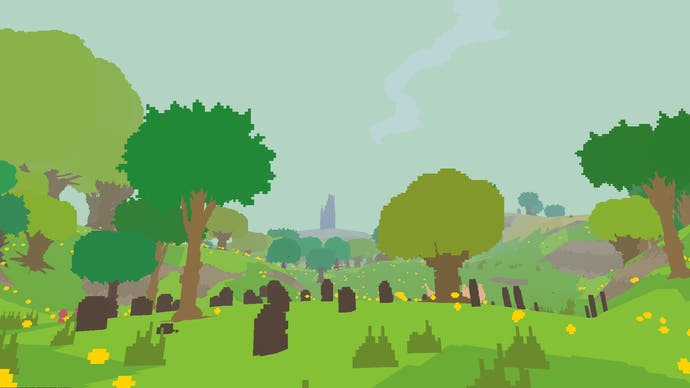
One of the wave of games in 2013 that sparked that awful term 'walking simulator' - so often used unfairly as a point of derision - there's plenty in common between Proteus and No Man's Sky. At times, Hello Games' feels like a ludicrously expansive riff on Ed Key's core concept as it delights in whimsical exploration fuelled by procedurally generated landscapes, while hints of David Kanaga's reactive soundtrack can also be felt in 65 Days of Static's score for No Man's Sky.
What they both share, too, is a sense of wonder that's gloriously pure, emboldened by a touch of the surreal. In Proteus it's the rural twisted through crude pixels, while No Man's Sky revels in the strangeness of other worlds. There may well be a gulf between No Man's Sky and Proteus in terms of scale, but the one thing that binds them is how they so brilliantly prove the restorative power of a walk in the wilds.
Noctis
Alessandro Ghignola, 2000
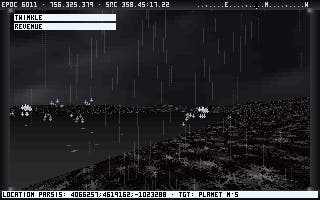
As if to prove that there is nothing new under the sun, or in this case, under an entire cosmos of stars, there's an eerie number of similarities between Noctis and No Man's Sky. In both you're exploring a seemingly infinite procedurally generated galaxy, touching down on planets that range from verdant to utterly barren. And in both you're uploading your discoveries to a vast log for others to see. Both have a soaring sense of ambition, but unlike No Man's Sky, Noctis can be a cold and unapproachable beast.
Part of that's down to its age, and to the nature of its creation. Sean Murray's been keen to impress that No Man's Sky has been the work of a small team, yet Noctis' is smaller still, the 2000 PC game conjured up by one Alessandro Ghignola. A modding community has kept Noctis active ever since, but it's still a tricky game to play thanks to a cumbersome, arcane interface. All of which only helps contribute to Noctis' sense of otherness. Its scratchy visuals and awkward controls make it feel as if you're an observer of some distant space mission, conducted in icy cold silence as strange new worlds flicker into view.
Star Raiders
Doug Neubauer, 1979
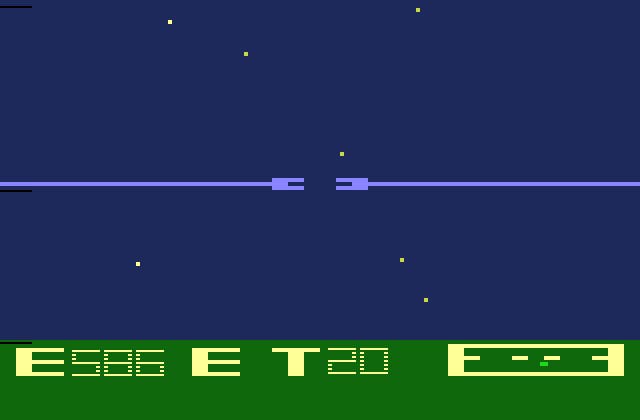
A personal favourite, if only for its ability to prove the power of the imagination. I first came across Star Raiders while staying at a friend's house on a short trip away as a wide-eyed 11-year-old only just coming around to the magic of science fiction, and was completely lost in its conjuring of entire star systems and the wonder of zipping around in the vast loneliness of space. While the 1982 Atari 2600 looks totally - and understandably, given the time - primitive today, a young mind does wonders in filling out the space provided by Doug Neubauer's game, and those stolen hours on a summer weekend many years ago have stuck with me ever since.
In my memory, anything was possible in Star Raiders. In reality, of course, Star Raiders is relatively limited, but as a pioneer of the space-faring genre it's a deeply important game. Without it there likely would have been no Wing Commander, no Elite - and by extension quite possibly Hello Games' own spin simply wouldn't exist. I love that out there somewhere there's an 11-year-old playing No Man's Sky for a few stolen hours who's going to be left with a similarly indelible mark.
Elite
David Braben and Ian Bell, 1984
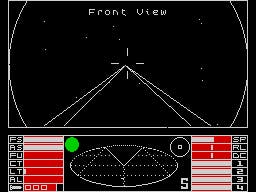
An obvious influence but an important one nevertheless, Ian Bell and David Braben's legendary BBC Micro and Acorn Electron space trading adventure remains one of the most important, formative games of any type. Its legacy is famously felt in games as diverse as Grand Theft Auto and, of course, No Man's Sky, but what's truly great is how Braben has been able to return to the formula, doubling back for the fourth game in the series almost 20 years after the last Elite.
Elite Dangerous is a more complex, slightly less showy counterpart to No Man's Sky, with more intricate systems and more fiddly controls. It's worth persevering with, and is every bit a worthy successor to the original Elite - and a perfect companion piece to the more accessible No Man's Sky to boot.
MirrorMoon EP
Santa Ragione, 2013
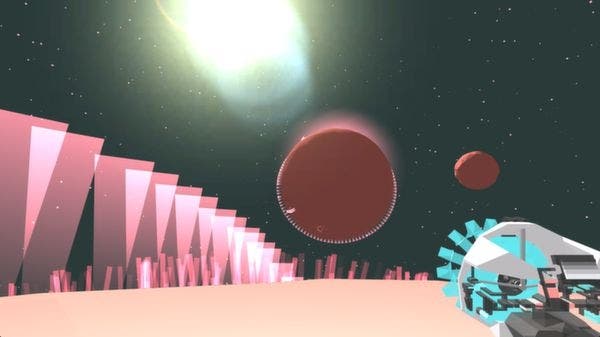
MirrorMoon EP launched to very little fanfare back in 2013, but word of mouth has helped it attain a certain cult status ever since (I came upon it myself when Eurogamer hero ex-editor Tom Bramwell gifted me a copy - passing on this gem like a sweet virus). Again, it's an eerily familiar premise with players exploring galaxy maps and getting to name planets if they're the first to put boots on the ground, but there's something much more eccentric about developer Santa Ragione's game. Its art is disconcertingly angular, its puzzles blissfully surreal all of which makes it feel that much more alien than many other games.
It's as if it wasn't made by human hands and instead landed here one day from a distant star, intact and enticingly mysterious. MirrorMoon EP might be a more modest game than the likes of No Man's Sky, but it's no less magical - and it's certainly worthy of much wider adulation and audience.
